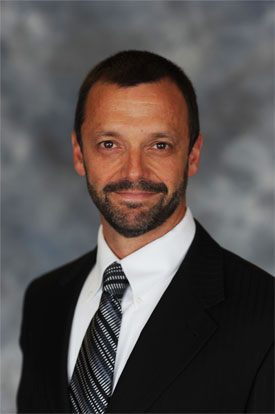When you earn your DC degree at National University, you have the opportunity to learn from experts in chiropractic sports medicine. For example, Timothy Stark, DC, DACBSP, is chair of clinical sciences at National University’s Florida campus, and is also Chair of the Education Commission for the International Federation of Sports Chiropractic (FICS). In his many years with FICS, Dr. Stark has worked at several Olympic games, and recently served as a sports physician at the 2011 Pan American Games in Guadalajara, Mexico.
The Road to Olympic Sports Medicine
How did Dr. Stark start a successful career in treating elite athletes? “After I graduated from my DC program, I did a residency  in sports medicine,” he explains. “This opened doors for me to assist in international events. During my residency in 1996, FICS was putting together a team of physicians for the Atlanta Olympics. I was able to go down as a resident to work with the leading sports chiropractors in the world.”
in sports medicine,” he explains. “This opened doors for me to assist in international events. During my residency in 1996, FICS was putting together a team of physicians for the Atlanta Olympics. I was able to go down as a resident to work with the leading sports chiropractors in the world.”
“While I was there, the sports chiropractors from Australia were visiting Atlanta to prepare for the 2000 Olympic Games in Sydney.” Dr. Stark got to know the Australians, and was invited to work at the 2000 Olympics.
Then, in preparation for the 2002 Winter Olympics in Salt Lake, FICS put together a sports chiropractic team that worked closely with the World Olympian Association and the International Committee in providing services for athletes and staff. FICS officially became one of those services, and Dr. Stark was part of its medical team.
“Olympic energy is crazy awesome! Being in the Olympic village and working around the athletes, the energy is fantastic. At each one, I had solid goose bumps for two weeks!”
Although he has had invitations to work at subsequent Olympic events, he stepped aside so that others could have the experience. He has, however, worked as a sports physician at several world games, including the 2011 Pan American Games in Guadalajara, and has taken a leadership role in FICS as Chair of its Education Commission.
How are DCs Selected by FICS for International Events?
Dr. Stark explains the nuts and bolts of how an interested DC can qualify to work at international sports events through FICS: “FICS coordinates with the medical organizing committee for the Pan American games, Olympic games and other international sports events. We then take applications from sports chiropractors that are interested in working at international events and review them. At a minimum, the physician must have an International Chiropractic Sports Science Diploma (ICSSD).” This specialized diploma is administered through Dr. Stark’s commission.
“FICS is concerned about quality of care for these international athletes, so we offer this post graduate diploma to assure a DC has minimum competency for sports chiropractic. In addition, FICS evaluates many other factors when choosing its sports chiropractic team: Do you speak multiple languages? Do you have past experience with international events? What’s your general demeanor?” says Dr. Stark.
The candidate’s attitude and demeanor are important. “Our doctors need to function as a team. There are times when you can put in a sixteen hour day and then get phone call asking you to work all evening. We need people who are not there to tour and take a vacation. It’s work! It’s early mornings, late nights, and often you are in a foreign country that might have cold showers, or you find yourself sleeping with no blankets,” he says.
The application process is ultimately scored by a point system based on the above criteria. FICS also likes to team up experienced physicians with younger ones. Dr. Stark has played both roles, and can always jump in and serve at an event when an experienced leader is necessary.
Leader in Sports Medicine Education
Dr. Stark travels around the world to train others for the ICSSD diploma process. “This August I need to be in Brazil to teach a sports chiropractic course. The 2013 world games are in Columbia and we need to train more Spanish speaking chiropractors.”
Dr. Stark has a long list of credentials in sports medicine education. He recently moved back to the United States after assisting Murdoch University in Western Australia in implementing a new School of Chiropractic and Sports Science. At Murdoch, Dr. Stark drafted and instructed the physical rehabilitation course as well as courses in clinical orthopedics, clinical neurology, physiotherapeutics and applied clinical nutrition. He also served as chair of post-graduate programs including the Masters of Sports Science.
He has also published on the topics of physical rehabilitation and strength and conditioning. His current research efforts are directed towards human performance and rehabilitation, soft-tissue injury management, and establishing a standard progressive process for implementing and teaching physical rehabilitation.
At National University, Dr. Stark teaches Functional Rehabilitation courses and Evaluation and Management of the Extremities. He is also advisor to the student sports council on campus. The group brings in guest speakers, explores how to diagnose and manage specific sports conditions, practices advanced sports medicine techniques, and coordinates outreach care at sporting events.
“We have a number of excellent faculty on our Florida campus who have a wealth of experience working with elite athletes, such as Dr. Carlo Guadagno and Dr. Jennifer Illes,” says Dr. Stark. He says that National University’s Florida Campus is a great place to be for DC students who want to start a career in sports medicine.




0 Comments